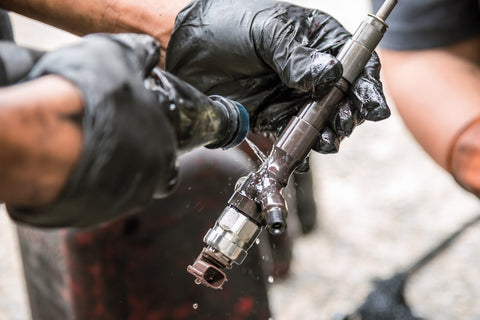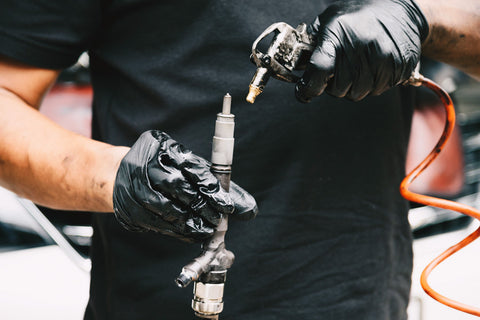Diesel vehicles have internal combustion engines and fuel injectors that may get clogged and dirty. So, regular maintenance ensures the car’s engine runs smoothly. Luckily, learning how to clean fuel injection system is very simple.
Improper and irregular cleaning routines may result in injector fouling, leading to damaged performance of the vehicle’s engine. Injector fouling is also a sign of disturbed fuel economy, causing frustrating and dangerous issues.
If such problems are left unaddressed, they may eventually cause severe engine damage. To avoid injector fouling issues, you must maintain and clean the fuel injection systems regularly. So, let’s discover what to put in gas tank to clean fuel pump.

Source: shutterstock.com/ Photo Contributor: PongMoji
How to Clean Fuel Injection System
Staying on top of fuel injector maintenance and knowing the right cleaning methods are necessary to ensure your car works properly. Some practices may work for different types of cars.
However, learning how to clean your fuel injection system with any approach is useful. Shortly put, first, you need to check the filter’s condition, then choose a suitable cleaner. After that, you should remove the fuel injectors from the engine and clean them.
The amount of injectors in a system depends on the number of cylinders a vehicle has. Every fuel injector must be cleaned separately, which may make the maintenance process lengthy and thorough.
Over time, buildup and other gunk can clog fuel injectors and reduce their ability to provide enough fuel to a car’s engine. In this case, the injector pump must be immediately cleaned to avoid further damage to the engine. So, here are in detail explained the common cleaning methods that we recommend:
Check the filter’s condition
Clogged injectors are a typical result of dirty air and gummed-up fuel filters. Thus, it’s important to check the filter’s condition before you start pulling your injectors. They are way easier to maintain than an entire fuel injection system.
Choose a suitable cleaner
The market offers suitable cleaners for diesel engine parts. These cleaning solutions can break down gunk and flush the injectors out. Using a fuel injection cleaner can be a preventive practice but also a way to unclog dirty injectors.
When choosing a fuel injector cleaner, you must determine whether the solution is compatible with your vehicle. Some cleaners are made to be used only with specific types of engines. So, ensure you read the labels before purchasing any fuel injection cleaner.
Furthermore, each cleaner has its advantages and disadvantages. Some are more expensive than others. You should consider the cost and budget allowance for a fuel injection cleaner. Also, you may find some cleaners more easy to use than others, which can help you determine which product is right for your engine.
Manufacturers, as well as we, advise you to pour the specified cleaner into an empty fuel tank. If you don’t know which type of cleaner to purchase, there are some popular products to choose from.
Chemical cleaners
The use of chemical cleaners is popular for fuel injection system maintenance. It involves adding the cleaner to the fuel tank and driving the vehicle until the product has dissolved and started working. Since its unpredictable results, this cleaning method is not the most effective for fuel injectors.
Mechanical cleaners
Cleaning a fuel injection system with mechanical cleaners includes attaching a specific cleaning device to the fuel injectors and running the engine. Mechanical cleaners are less cost-effective than chemical cleaners. Yet, they are considered more effective.
DIY cleaning process
Having your fuel injection system professionally cleaned may be expensive. Hence, many people find ways to do it by themselves. First, you need to pull out the fuel injectors from the engine, soak them in a cleaning solution, and remove the remaining debris at the end.
Additionally, you may need a few tools to clean the fuel injectors, including a socket wrench, a screwdriver, a suitable cleaning solution, and compressed air. This method is cheaper than other cleaning practices but can be time-consuming.
Remove the fuel injectors from the engine
Professionals in this industry and vehicle manufacturers would argue that the best way to clean fuel injectors is to remove them from their engines.
This method is meticulous, time-wasting, and requires effort. However, it’s definitely worth it, especially if your diesel injectors haven’t been regularly maintained and have a lot of gunk that keeps the vehicle from running efficiently.
Detach the fuel injectors from the engine and disconnect the fuel supply to remove the fuel rails. Then, remove the rubber ring-like part from the rail side of the fuel injector. Next, add a rubber hose to the opening to prevent the cleaner from spilling.
Electricity is vital to the proper cleaning of a fuel injection system. Therefore, connect the electrical lead to the injectors. Then, attach the rubber hose to the outflow side to ensure a smooth flow of the cleaner and eliminate any build-up that might still be stuck inside.
So, you will likely have a completely clean fuel injector by this point. Ensure you have brand new o-rings to replace the old ones and re-insert them into the fuel injector. Then, repeat the same process to clean the remaining injectors.
Can You Clean Fuel Injectors Without Removal?
Do you want to know how to clean fuel injectors without removing them from the engine? There are some options to do this. Most commonly, owners use gasoline additives to clean their fuel injectors without having to tear apart a vehicle’s engine.
However, these types of alternative cleaning methods have some disadvantages. The gasoline additives may dilute into the gas tank and flow in only one direction, causing their lower levels of effectiveness when it comes to complete fuel injection cleaning.
Investing in a fuel injector cleaning kit may be a better solution. They come with a canister holding the cleaner and a hose that attaches to the fuel injectors. The canister creates a steady, cleaner flow after it’s poured into the fuel injectors.
Once all the cleaner is emptied from the canister, you can consider your fuel injection system clean without removing it. However, although a cleaning kit might be useful for this purpose, you should read the manufacturer’s maintenance instructions to ensure you do the job correctly.
What Are the Signs of a Dirty Fuel Injection System?
A few different signs may indicate that fuel injectors are clogged. These include misfires or improper fuel delivery to the cylinders, causing loss of power and performance issues.
Increased emissions and the engine using more fuel than usual may also be seen as symptoms of a dirty fuel injection system. As a result of clogged injectors, issues with starting the vehicle may also occur.
How Often Should You Clean a Vehicle’s Fuel Injectors?
Regular maintenance is crucial for keeping your fuel injection system clean and preventing clogging. High-performance vehicles use ethanol-based fuel that often leads to clogging and corrosion, requiring injector servicing more often than other car types.
How often you clean a vehicle’s fuel injectors depends on a few factors, like the type of vehicle you drive and the fuel type. Usually, fuel injectors should be cleaned once every few months to prevent build-up.

Source: shutterstock.com/ Photo Contributor: PongMoji
Conclusion
Keeping your injectors clean is important to ensure your vehicle is running right. So, we hope you learned how to clean fuel injection system by removing and without tearing apart your car’s engine.
Whatever approach you choose will be worth your time and effort in the long run! If you need any diesel parts for your vehicle or some fuel injection pumps, you should contact us now! We offer the best quality!



